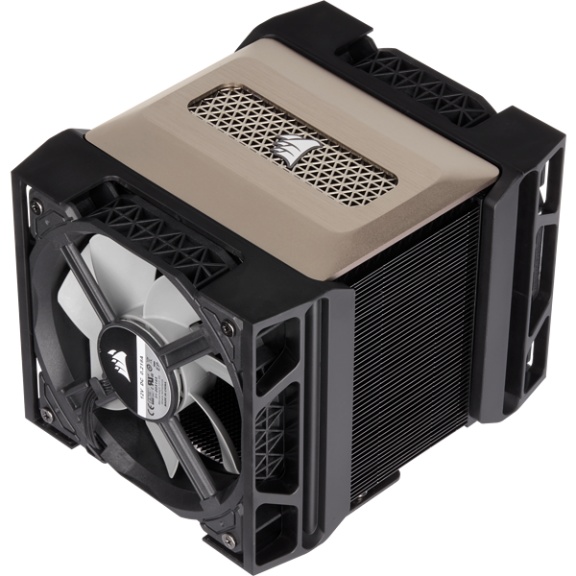Your gaming machine should be just like you: reliable under pressure and cold. To do this, the case of your Laptop needs to be fitted with adequate refrigeration and fans. However, success isn’t the only thing that matters. You don’t just want to be calm. After all, you want to look cool too. And in 2019, nothing says “smart” quite like RGB lighting at least as far as RGB lighting is concerned. That’s why we set out to find the best CPU cooler fan available on the market today.
We checked our top five choices and included below a guide to learn what to look for while shopping for fans of computers. You may want to check out our Best Case Fans if you’re not interested in the new premium price associated with Best CPU cooler PC.
There have been significant developments in information technology over the years. But, unfortunately, it is pretty much the same as it always was when it comes to machine cooling technology. The process is mostly unchanged-a fan draws within the cold air and moves outside the warm air.
Naturally, one can easily use other methods, but they are either too complicated or too costly. There has been one shift, however, and it concerns sure fans ‘ aesthetics. Nowadays, they have RGB lights, and these are sure to make your rig display real light. If you want these kinds of fans inside your PC but don’t know anything about them, please read on.
5 Best CPU coolers To Look For In 2020
Fan positioning opinions differ and have the best airflow. An excellent way to start is to maintain an atmosphere of neutral pressure as stagnant, hot air accumulating around your components does not support any PC. You’ll mostly want to make sure you’ve got a different number of intake and exhaust fans, so the air moves within your PC case. Whether positive or negative air pressure should do the job to ensure that cold air is drawn into your case while expelling hot air.
When deciding which PC fans to invest in, there is a growing selection of choices. First off, you’ll want to find out the size of the fans you’re going to need and how many will hold your Laptop case. Some of the better mid-tower Cases allow up to five 140 mm fans, but to find out what you need, you should check the specs of your specification of the PC case. You can opt for quiet fans or bright, RGB lighting if you don’t mind the extra cost.
We’ve picked and listed some of our favorites below and some of the key points we think to make them stand out. Instead, if you’re looking for any of the best CPU coolers online, we’ve covered you up there as well.
Corsair LL120
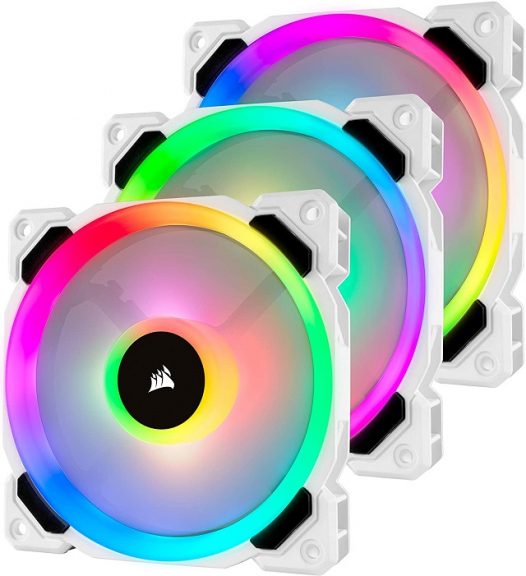
As for RGB, it’s all about the looks. RGB lighting does not make the PC run faster and does not boost benchmarks or frame rates, contrary to some claim. However, RGB will make your machine look fantastic, and maybe even make all your friends jealous of your excellent combat station. If this is what you’re seeking, then the Corsair LL120 will be the best RGB case fans for aesthetics.
Pros
- Such fans feature a light ring within the fan hub that beams light out through the fan blades.
- In contrast, a second light circle on the fan’s outer frame provides an outer halo of stationary lights around the fan.
- One of these loops has eight individually addressable RGB lights, controlled for loads of customization through Corsair’s iCUE program.
- Corsair’s program uses the 16 RGB LEDs on each fan for virtually infinite animations and color combinations.
- A range of packages is available, including single, double, or triple fan packs.
- You may also choose to have the lighting node included or not, but you’ll need one to run all the fans and RGB.
Cons
- Although these fans do not deliver the complete airflow, they are reticent and, in reality, the highest on our list, offer excellent static pressure.
- Corsair makes them the best on RGB radiator fans’ market as they can quickly blast air through dense radiators.
NZXT Aer RGB
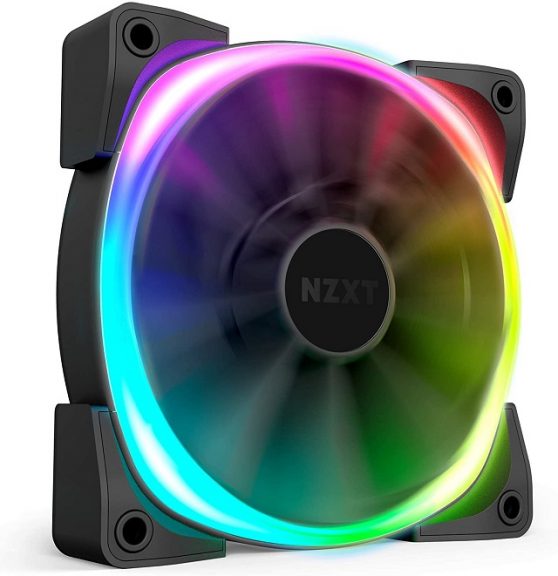
Now that we’ve covered a fan for those who only search for the most luminous ways to cool their PC, let’s take a look at some fans who put efficiency at the top of their list. The NZXT Aer fans live up to their name for their scale, with excellent airflow.
Pros
- Such fans are available in 120 mm and 140 mm models, with the larger model at the same RPM and noise level provides higher airflow and static pressure. Those fans are pretty noisy when it comes to noise level, particularly for the relatively low RPMs they run.
- If you’re searching for a quiet fan, that’s not it, but if you want fans in your case to replenish the air and keep your equipment cool quickly, then that’s the right choice.
- The 120 mm RGB fan pushes air at 52 ft3/min while the 140 mm RGB fan pushes an incredible 91 ft3/min.
- There is ample airflow to keep cool for very high-end equipment, which is the highest on our list.
- Even though the pressure on the Corsair LL series fans we looked at was not quite intense, these NZXT fans still give enough static pressure to be used on radiators.
Cons
- As for the lamps, these fans have a single light loop around the fan’s frame’s circumference and lack lighting inside the fan’s blades.
- These fans come either individually or as a triple pack.
- Sadly, they do not come with some fan controller or hub, making it essential to make sure you have enough of the right kinds of connectors on your motherboard. Otherwise, you’ll need to pick up a hub separately.
Thermaltake Riing Trio
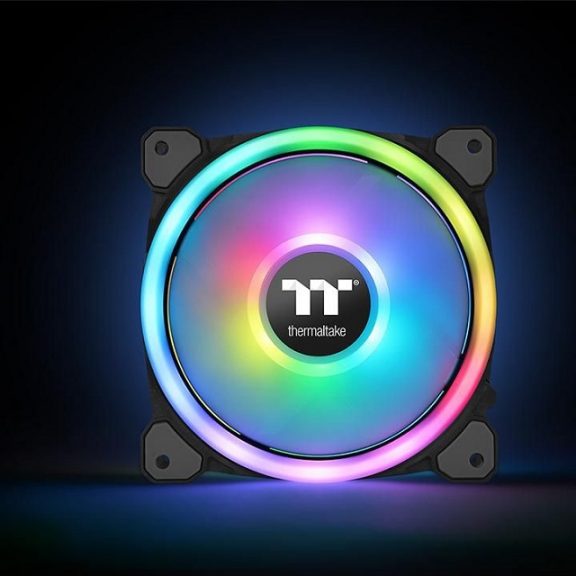
Given the fact that in this article, we opened our reviews by praising the 16 RGB lights in the fans of the Corsair LL sequence, there is another contender on the market that can give Corsair a run in the RGB department for their money, and that is Thermaltake.
Thermaltake jammed into their Riing fans an impressive 30 individually-addressable RGB lamps. There is a light loop on both sides along the bottom of the fan, each of which comprises 12 lights, and the fan blades themselves are lit by the remaining six. It makes these RGB PC fans absolutely the greatest and the undisputed kings of radiance.
Pros
- But the fact that these fans also come with an included hub that allows you to plug in up to five of the fans and monitor them easily via software is even better than that.
- Thermaltake’s app also includes some exclusive and impressive features, such as integration with Alexa, that allow you to change your fans ‘ color and speed using voice commands.
Cons
- So now you’re probably wondering why these aren’t at the top of our list right now, and the answer is results.
- Well, RGB is all about being cool and all. Still, when it comes down to it, we feel more comfortable recommending the Corsair fans that will save you money, and work better with higher airflow and static pressure while still looking fantastic, over Thermaltake’s lower output for free vibration.
Cooler Master MF200R
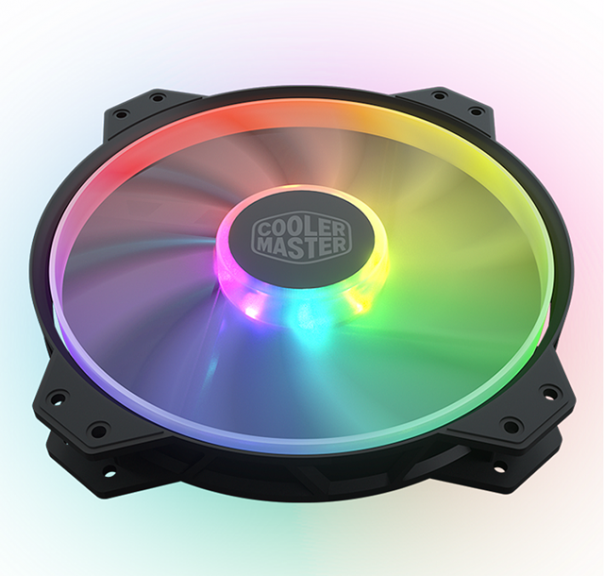
When it comes to case fans, one size acts like the mighty supreme predator at the top of the food chain: 200 mm. Such enigmatic fans are relatively challenging to find and are mostly seen in smaller situations, counterintuitive. Nonetheless, they offer some exciting benefits, so let’s look at why a 200 mm Best CPU cooler could be right for you.
Pros
- More massive fans will pump up more air per minute in your event, as you probably already know.
- This 200 mm fan flaunts the second-highest airflow rate of any of the fans on our list, only beaten by the 140 mm NZXT Aer fan.
- However, the NZXT offering has to turn around twice as quickly to achieve its narrow victory over this 200 mm fan from Cooler Master
- Larger fans not only transfer tons of air but also operate at a lower RPM; hence, less noise is created.
Cons
- So if you are looking for a fan that can deliver excellent cooling alongside almost silent results, it may be worth checking out the big fans.
- These fans also support nearly any RGB controller and software, including ASUS Aura Sync and Gigabyte RGB Fusion.
- That said, make sure that your case suits one of these beasts before you buy one.
upHere Wireless RGB Fan pack
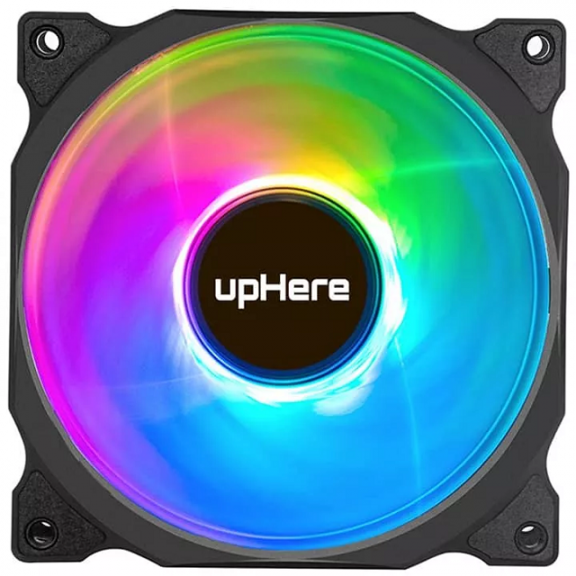
Best CPU cooler can be very pricey, and some of the products on our list’s price tag were probably even a little shocking to some as the packages could easily hit over $100. Okay, a business named upHere has decided to end the insane prices that surround Best CPU cooler PC and deliver a fantastic price for a five-pack of fans.
Pros
- You can get your hands on one of these budget-friendly powerhouses and light up your rig like never before, for less than the cost of a single LL-series fan from Corsair.
- Five fans are a lot for one thing, particularly at this price. Five fans are more than even other high-end gaming machines ever would have.
- What’s even more remarkable, though, is that these fans have performance specs similar to the much more costly Corsair LL fans.
- In reality, these upHere fans have more airflow and almost as much static pressure while being even quieter than the LL series fans.
Cons
- It is here where the expenses come in. Many corners had to be cut when making these fans, to make them so cheap.
- Such fans are powered by a wireless controller, rather than software, which means you may have less control over the color and light pattern.
How to Pick the Best CPU cooler for Your Needs
Now that we’ve been looking at our top five picks for Best CPU cooler let’s take a closer look at what some of the stats we talked about mean and what to look for while shopping for fans.
Airflow
The first thing that people think about when they talk about fans is airflow. Airflow can be measured in various ways, but we held it down to cubic feet per minute for our purposes. It is an objective indicator of the air amount that the fan can pass at its full RPM while operating.
The more airflow a fan needs to keep your hardware cool, the more air it will move into your case or over your heatsink. If you are looking for the best possible airflow, then the NZXT Aer is an excellent choice. This ventilator comes in either 120 mm or 140 mm, with the option of 140 mm providing the highest airflow in our list.
When moving so much air, these fans are noisy–or at least louder than other options–so if you go for full airflow, then the Cooler Master MF200R is a viable choice. This vast 200 mm fan moves nearly as much air as the 140 mm NZXT fan, but with much lower RPM and less noise due to its more extensive scale.
Static Pressure
The other important feature to look at when shopping for fans–and not discussed quite as often–is static pressure. Static pressure is a function of how hard the air is blown by a fan and is expressed in mmH2O.
It is critical if you intend to use the fan to cool a radiator or heatsink as these pose a direct barrier in the airflow direction. That means the fan needs to move the air through or through the heat sink or radiator, which decreases the overall airflow.
Fans with higher static pressure will use radiators and heatsinks to move air more quickly. If you plan to use your Best CPU cooler Fan for this, then we suggest using the Corsair LL 120 fans as they give any of the fans in our roundup the best static energy.
Noise
The fact of loud case fans was inevitable as recently as a few years ago, screaming fans were the startup rule. Nevertheless, many of the fans on the market nowadays deliver excellent cooling efficiency and are super quiet.
Nearly all the fans on our list are virtually silent, with most of them having decibel rates of about 25-30, which is a little quieter than the standard library’s noise.
Nevertheless, if you search for the quietest possible fans, then the upHere wireless Best CPU cooler is a great choice. However, due to their budgetary nature, they may not have the highest build efficiency or durability. Fans of the Corsair LL series are another excellent choice for those looking for a silent PC but looking for a little more consistency out of their purchase. Corsair makes reticent fans with decent performance and great looks, so you can’t go wrong with those.
The Types of CPU Cooler
There are two major styles of Laptop fans, those being case fans and CPU fans. The CPU’s are attached to the processor’s heat sink, as the name implies, and their function is to keep the CPU cool by removing the hot air. On the other hand, the case fans move the air inside your machine’s case and are usually mounted on the back and front of the case. We push the debris and the dust even through the casing.
PCs will usually have a single CPU fan and a few case fans. At least one of those case fans will be responsible for bringing the cool air inside, and one of them will blow out the hot air.
A reasonable practice should be to have more intakes to prevent a vacuum from occurring within the frame than exhaust fans do.
Best CPU coolers are typically the case fans because, unlike their CPU-related counterparts, they can be placed at various positions. And when it comes to making a light show out of your computer case, they provide the most versatility.
The Sizes of CPU Coolers
Usually, the sizes of case fans range from 25 mm up to 250 mm. Typical sizes include 200 mm, 140 mm, 120 mm, and 80 mm. Each of these measurements comes with different advantages and disadvantages, and each is suitable for particular types of users. The most important thing for an ideal size is to test that it fits into your PC casing.
If your rig doesn’t get too heavy, your best option is the 80 mm case fan. These models generate less air but are still very noisy because of their small scale. Today, they are the cheapest choice.
In comparison, 120 mm versions can provide more air because of their more full blades. These blades’ size allows them to work slowly, which is good because it creates less noise.
For a couple of reasons, the 140 mm are the most common. They have big blades that don’t have to spin too fast because they already generate the right amount of airflow. Also, this results in less noise and longer shelf life.
Finally, the 200 mm models are the quietest and able to suck in loads of air. Their only downside is that they need more strength, but their pros far outweigh the drawbacks. Most models feature switches that allow you to find a balance between the output of noise and cooling.
The Noise
As you can already imagine, the noise is a clear indication of how well a satisfying case fan works. It can be very distracting for noisy fans. Smaller models typically create more noise as they run at higher velocities. The noise can be incredibly annoying to gamers because it breaks down immersion quickly.
Despite their smaller blades, PC fans with larger sizes don’t make as much noise. These operate at a slower pace, which results in less pronounced noise in effect. It’s also worth mentioning that these bigger fans are even more costly, but if you want to have a little background noise as possible, that should not be a concern.
The Speed of CPU Cooler
The fan speed is measured in RPMs, which stands for Per Minute Revolutions. It contributes significantly to a specific fan’s success. It’s not a feature to look into. The general rule of thumb is that faster models have more excellent airflow but also produce more noise. In comparison, the slower models provide less airflow but are still not as noisy.
It is essential to strike a balance between these two variables because it is sure to save power and boost efficiency. A successful combination will, in our view, be a model that is larger but operates at less RPM-such a fan will produce better airflow, minimize noise, and save energy.
The Colors
As the name suggests, the CPU cooler PC provides a broad spectrum of color because of the variations of the three primary colors: red, green, and blue. Since this part is entirely up to the consumer, our only recommendation will be to get a model that comes with robust, easy-to-use software that will allow you to monitor these colors. Many models come with a range of pre-configured color schemes, but of course, you can make your schemes and thus customize your rig’s look.
These were some of the key features that you need to look for when you buy an RGB fan for your machine. While keeping in mind the above considerations, you will end up with Best CPU cooler who will give your PC a new look and support you in the years to come because of their longevity and excellent performance.

